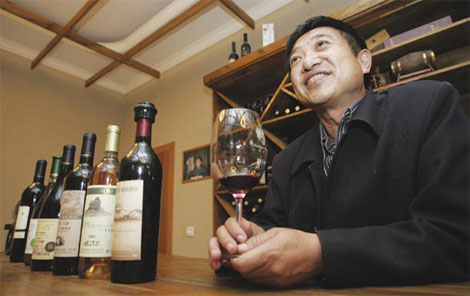|
 |
| Geng Xuegang, owner of winery Chateau Gains, says nothing is impossible if you devote yourself to it. [Photo/China Daily] |
QINHUANGDAO, Hebei- When Geng Xuegang was encouraged to switch from growing table grapes to those destined for wineries in the late 1990s, he went one step further.
He put his family business - three generations of grape growing - at risk when he decided to set up a winery.
"Wine grapes were being sold at only 4-5 yuan (61-75 cents) a kilogram, and I realized that our income could be increased five times if we turned them into wines ourselves," said Geng.
"Nothing is impossible, if you devote yourself to it," said Geng, 46, who runs a family winery, Chateau Gains, in a small village in Changli of Qinhuangdao, a coastal city of Hebei province in North China.
His wife, Zhao Xixia, wasn't supportive at first, afraid Geng was taking too much of a risk and that he would lose all their money. After all, Geng's family has been growing muscat grapes ever since his grandfather's days.
But Geng had made up his mind. He turned his house into a winery, adopting a "chateau wine" concept, which employs elaborate grape-growing and winemaking techniques.
He also realized wine growing and production would make promising businesses for local farmers.
"I didn't give up my entire business on fresh table grapes, but I put more effort on wine grape growing and winemaking," Geng said.
Like most farmers, Geng was using traditional methods and seeds to grow table grapes. Local buyers were his only market and prices fluctuated.
"At that time life was hard, because the competition was very fierce," said Geng. "Grapes were sold very cheaply."
But that was before. When dry red wine production began in Changli in 1983, Geng's life began to change.
Many large Chinese and joint venture wineries began to spring up. Without their own land, the wineries signed contracts with the local government to buy grapes from local farmers.
"It was the first time I was introduced to wine grapes and wine," said Geng. "With the seeds, subsidy and technique support the wineries gave us, I learned how to grow wine grapes.
"I knew it was going to be a huge market, because unlike in the past, when we can barely satisfy our basic needs, we want a better life now."
When Geng started making wines, he had only a bit of experience making baijiu or Chinese liquor. He found it hard going at first, learning how to make wines such as cabernet sauvignon and muscat hamburg.
In 2000, Geng went to Northwest A&F University in Xi'an, Northwest China's Shaanxi province, to study viniculture. Two years later, he made his first trip to Bordeaux, the famous French winemaking region, and other wineries in Europe.
"It was worth every penny going there," Geng said. "Most vineyards in Europe are family-style workshops. They don't work on volume, but quality.
"I think I can develop a chateau with my own vineyard, just like they did."
In 2004, Geng spent more than 400,000 yuan ($61,000) to build his chateau, including buying winemaking equipment from France and Italy.
"Grapes mature over a very short period of about four weeks, so we rely greatly on the weather," Geng said.
"Even though we worked very hard in the fields, it happened a lot that we end up with no gains, because of the bad weather."
To expand the plantation area and meet market demand, Geng started to encourage nearby farmers to join his business and combined, they grow grapes on about 50 hectares. Geng even set up a wine and vine school to train his neighbors.
With experts from China Agricultural University and the grape wine administration bureau of Changli county, Geng founded the Changli County Xieshi Wine Industry Association, with hundreds of household grape growers.
Now, his Chateau Gains produces cabernet sauvignon, merlot and muscat hamburg, with an output of more than 130,000 bottles a year, retailing for between 48 yuan and 400 yuan each.
This makes Geng's vineyard a very tiny player in China's wine industry, which produced more than 700 million bottles last year, selling for between 30 yuan and 1,000 yuan each at supermarkets.
Chateau Gains wines are now selling well not only in the local market, but also in other cities in Hebei province, thanks largely to word-of-mouth marketing.
To attract clients, he provides not only wine tasting, a short tour of the vineyards and a dim cellar filled with wines stored in oak barrels, but also accommodation in 10 rooms at the chateau.
"The real good wines never come out from mass production lines," said Geng. "If Bordeaux can produce fine wines, why can't we do that, too?"
|